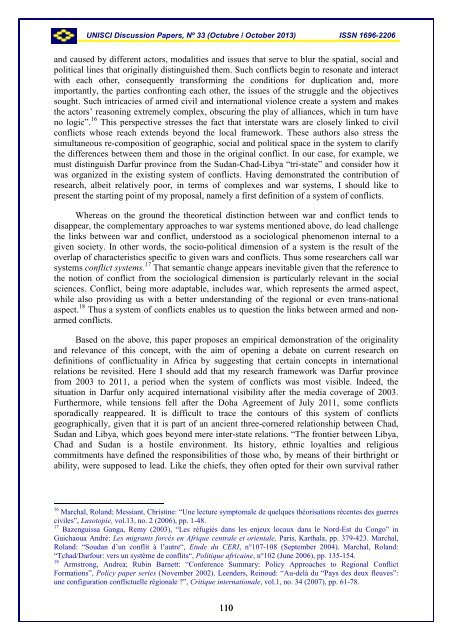UNISCI - Universidad Complutense de Madrid
UNISCI - Universidad Complutense de Madrid
UNISCI - Universidad Complutense de Madrid
You also want an ePaper? Increase the reach of your titles
YUMPU automatically turns print PDFs into web optimized ePapers that Google loves.
<strong>UNISCI</strong> Discussion Papers, Nº 33 (Octubre / October 2013) ISSN 1696-2206and caused by different actors, modalities and issues that serve to blur the spatial, social andpolitical lines that originally distinguished them. Such conflicts begin to resonate and interactwith each other, consequently transforming the conditions for duplication and, moreimportantly, the parties confronting each other, the issues of the struggle and the objectivessought. Such intricacies of armed civil and international violence create a system and makesthe actors’ reasoning extremely complex, obscuring the play of alliances, which in turn haveno logic”. 16 This perspective stresses the fact that interstate wars are closely linked to civilconflicts whose reach extends beyond the local framework. These authors also stress thesimultaneous re-composition of geographic, social and political space in the system to clarifythe differences between them and those in the original conflict. In our case, for example, wemust distinguish Darfur province from the Sudan-Chad-Libya “tri-state” and consi<strong>de</strong>r how itwas organized in the existing system of conflicts. Having <strong>de</strong>monstrated the contribution ofresearch, albeit relatively poor, in terms of complexes and war systems, I should like topresent the starting point of my proposal, namely a first <strong>de</strong>finition of a system of conflicts.Whereas on the ground the theoretical distinction between war and conflict tends todisappear, the complementary approaches to war systems mentioned above, do lead challengethe links between war and conflict, un<strong>de</strong>rstood as a sociological phenomenon internal to agiven society. In other words, the socio-political dimension of a system is the result of theoverlap of characteristics specific to given wars and conflicts. Thus some researchers call warsystems conflict systems. 17 That semantic change appears inevitable given that the reference tothe notion of conflict from the sociological dimension is particularly relevant in the socialsciences. Conflict, being more adaptable, inclu<strong>de</strong>s war, which represents the armed aspect,while also providing us with a better un<strong>de</strong>rstanding of the regional or even trans-nationalaspect. 18 Thus a system of conflicts enables us to question the links between armed and nonarmedconflicts.Based on the above, this paper proposes an empirical <strong>de</strong>monstration of the originalityand relevance of this concept, with the aim of opening a <strong>de</strong>bate on current research on<strong>de</strong>finitions of conflictuality in Africa by suggesting that certain concepts in internationalrelations be revisited. Here I should add that my research framework was Darfur provincefrom 2003 to 2011, a period when the system of conflicts was most visible. In<strong>de</strong>ed, thesituation in Darfur only acquired international visibility after the media coverage of 2003.Furthermore, while tensions fell after the Doha Agreement of July 2011, some conflictssporadically reappeared. It is difficult to trace the contours of this system of conflictsgeographically, given that it is part of an ancient three-cornered relationship between Chad,Sudan and Libya, which goes beyond mere inter-state relations. “The frontier between Libya,Chad and Sudan is a hostile environment. Its history, ethnic loyalties and religiouscommitments have <strong>de</strong>fined the responsibilities of those who, by means of their birthright orability, were supposed to lead. Like the chiefs, they often opted for their own survival rather16 Marchal, Roland; Messiant, Christine: “Une lecture symptomale <strong>de</strong> quelques théorisations récentes <strong>de</strong>s guerresciviles”, Lusotopie, vol.13, no. 2 (2006), pp. 1-48.17 Bazenguissa Ganga, Remy (2003), “Les réfugiés dans les enjeux locaux dans le Nord-Est du Congo” inGuichaoua André: Les migrants forcés en Afrique centrale et orientale, Paris, Karthala, pp. 379-423. Marchal,Roland: “Soudan d’un conflit à l’autre“, Etu<strong>de</strong> du CERI, n°107-108 (September 2004). Marchal, Roland:“Tchad/Darfour: vers un système <strong>de</strong> conflits“, Politique africaine, n°102 (June 2006), pp. 135-154.18 Armstrong, Andrea; Rubin Barnett: “Conference Summary: Policy Approaches to Regional ConflictFormations”, Policy paper series (November 2002). Leen<strong>de</strong>rs, Reinoud: “Au-<strong>de</strong>là du “Pays <strong>de</strong>s <strong>de</strong>ux fleuves”:une configuration conflictuelle régionale ?”, Critique internationale, vol.1, no. 34 (2007), pp. 61-78.110
















